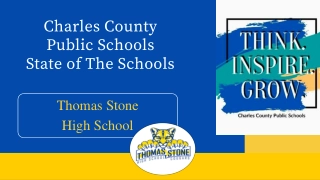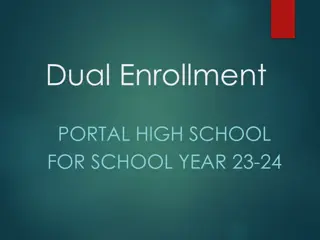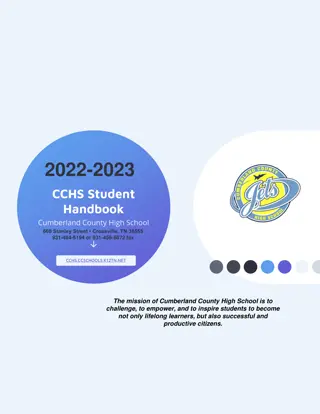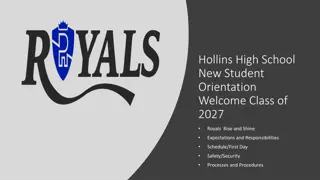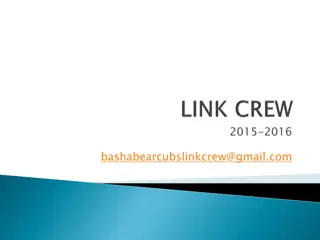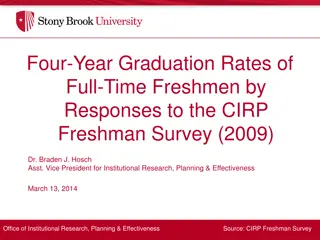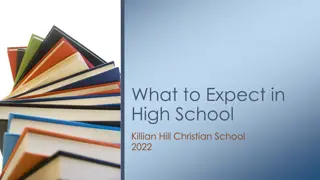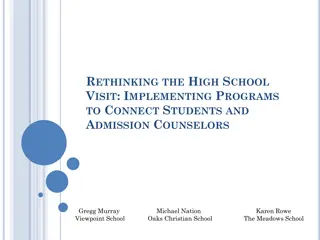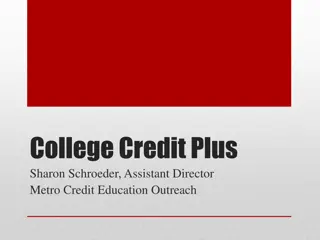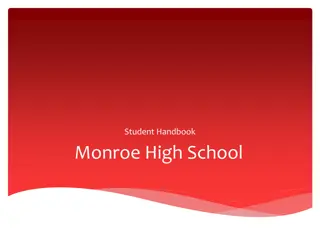
High School Planning Guide for College Success
Learn about factors colleges consider beyond academics, explore high school graduation and college entrance requirements, and discover tips for academic motivation and extracurricular involvement to prepare your scholar for college admissions success.
Download Presentation

Please find below an Image/Link to download the presentation.
The content on the website is provided AS IS for your information and personal use only. It may not be sold, licensed, or shared on other websites without obtaining consent from the author. If you encounter any issues during the download, it is possible that the publisher has removed the file from their server.
You are allowed to download the files provided on this website for personal or commercial use, subject to the condition that they are used lawfully. All files are the property of their respective owners.
The content on the website is provided AS IS for your information and personal use only. It may not be sold, licensed, or shared on other websites without obtaining consent from the author.
E N D
Presentation Transcript
Chat with your neighbor(s) How is school/life/work/volunteering going for your scholar right now? How is CAT Mentoring/Academic coaching going for your scholar? Any conversation with your scholar about college since the last Saturday program? What questions/needs do you/your scholar have currently?
What are some of the factors, other than academics, that you think colleges consider when making admission decisions?
As you plan your high school experience, its helpful to use three things as a guide: 1) high school graduation requirements 2) college entrance requirements, and 3) personal interests and goals.
https://www.dpi.nc.gov/districts-schools/high-school- graduation-requirements#future-ready-course-of- study-22-credits-students-entering-grade-9-in- 2020-2021 Community Colleges These 58 colleges maintain an Open Door admissions policy which provides for the admission of anyone who is 18 or older or who has attained a high school diploma or its equivalent. Community Colleges Independent Colleges and Universities Entrance requirements for North Carolina s 36 independent colleges and universities vary among institutions. Prospective students should check the websites for individual colleges and universities to determine specific entrance requirements or call the admissions office. Independent Colleges and Universities Source: www.cfnc.org
An easy way for your student to demonstrate academic motivation and delve into areas of interest. They can take the opportunity to explore their creative side and/or higher level courses in core classes (e.g. math and history). Allows them exposure to topics and activities that may develop into interests, courses of study in college/major Beware the late in/early out/library or office assistant Importance of having a full schedule all four years Junior/Senior year: consider CTEC, ACC Career and College Promise Program Collegiate Start @ Elon (Senior year only) Benefits of college classes in high school
Anything your child is involved in that is not a high school course or paid employment Goes beyond school-sponsored groups/sports (band, Art Club, or basketball) Includes: Community Service/Volunteering Family Activities Hobbies
https://bigfuture.collegeboard.org/get- started/outside-the-classroom/extracurriculars- matter-to-you-and-to-colleges College Board resources for parents: https://bigfuture.collegeboard.org/get- started/for-parents/parent-action-plan-10th- grade Encourage leadership roles, intentional selection, longevity of participation
Arts: theater, music, dance, painting, photography Church Activity: community outreach, helping the elderly, event planning, community suppers, bible school, Sunday School, offering, planning and helping with festivals Clubs: Key Club, Art Club, Spanish Club, Quiz Bowl Community Activity: community theatre, event organizing, participation in festivals Governance: student government, school committees Hobbies: collecting, model railroads, blogging, knitting Media: web work, school newspaper, yearbook staff Military: drill teams, ROTC Music: solo efforts, school and/or church related Sports: school, church, bowling leagues, dance, etc Family Activities: travel, bowling leagues, rock-climbing Volunteer Work and Community Service And ..ELON ACADEMY!!
What skills do extracurriculars develop and stregthen in your student? Leadership Problem solving Time management Responsibility Community engagement Teamwork Cooperation Confidence Discipline Public speaking Communication skills Organization Keep track of extracurricular involvement Time management to balance schoolwork and extracurriculars Consider how to talk about it/write about it when it comes time for college/scholarship applications
What is your scholar involved in? What skills do you think it builds for them? Are there any gaps in their high school experience currently? (e.g. courses they need- academic or elective, or extracurricular activities) What challenges does your scholar face in any of these areas? How have you overcome these?

